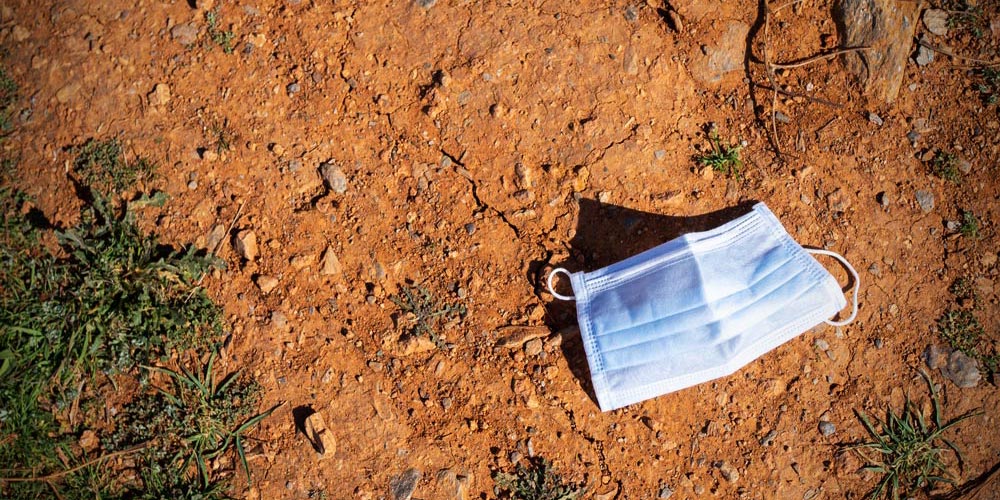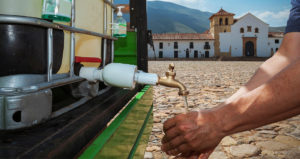- SIWI – Leading expert in water governance
- /
- Latest
- /
- Ingenuity & silver linings in the time of Covid (part 1)
Ingenuity & silver linings in the time of Covid (part 1)

During the pandemic, Sweden famously didn’t lockdown like the majority of its European neighbours. At SIWI, however, with projects on all continents, we have been forced to overcome a diverse set of challenges. The creative solutions our staff have devised have not just coped with the complex situation, but they have laid the ground for expanding our project work in the field. This will potentially reach wider audiences and have a much greater impact than was envisaged for the original scopes of work, planned pre-pandemic.
In this, the first of a two-part series, we look at a dramatic redirection of efforts that SIWI’s Africa Regional Centre (ARC) was forced to make as the pandemic’s grip started to tighten. We catch up with Anna Wikman (Program Manager for ARC) who talks us through their approach.
Back in 2019, the team at ARC developed three training programs in Ethiopia, in key areas identified as being bottlenecks for national water management. The residential courses attracted participants from across the country, and were based at Ethiopia’s top universities, textile factories and governmental institutions.

As the weeks rolled by in early 2020, the country was facing various troubles. Ethnic and political tensions had been simmering for a couple of years previously, which periodically exploded into episodes of violence. Parts of the country were often left without basic services for days at a time. Then as Covid-19 started to sweep the country, ‘Stay at Home’ recommendations and strict travel restrictions were put in place. Ultimately, a state of emergency was declared as the authorities struggled to manage the escalating problems.
Various members of the ARC team then contracted Covid-19 (all have since recovered) and in March 2020, they were forced to cancel the training programs. Not wanting to lose the momentum they had already garnered within the Ethiopian water sector, nor the crucial support from the academic institutions, they immediately started investigating different avenues they could pursue for continuing their trainings.
As much of the rest of the world switched to online learning during 2020, Ethiopia struggled with limited digital literacy, low bandwidth across the country and a lack of available platforms. Internet usage is primarily driven by entertainment needs in Ethiopia, with social media and other recreational apps predominating. ‘Productive’ digital platforms, required for standard online training programs, are not in common use.
The team approached various organizations to help them address these technical issues – and another monumental challenge; how to keep a diverse range of participants engaged and motivated in a learning format, for which they were completely unaccustomed. Recent data from other course providers suggests that the completion rate for online courses can be as low as 10%. Unfamiliar learning methods combined with waning self-motivation, as participants study at home alone, are thought to be the principal culprits.
Each of the three courses had its own set of requirements, which the learning material had to accommodate. But all employed the same video format uploaded onto the Telegram app, Ethiopia’s most popular social media platform. Some videos were bite-sized and straight to the point for busy participants, whilst others were longer and more technical. To keep momentum going through the most demanding course, gaming rewards could be collected, and the most interactive participants were visibly recognized each week. Certificates were also offered upon completion, to encourage students to see them through to the end. As word of the engaging courses spread, one of them grew from 100 students initially, to over 700 by the end.
Beyond the courses’ core material, voluntary quizzes and live discussions were organized on Saturdays. Each session always had a popular and lively dialogue, and the team were astounded at how interactive the participants were. Indeed, active discussion and experience-sharing was seen throughout the courses, in total contrast to the taciturn students the team had previously observed in the classroom. Such is the cultural norm in Ethiopia, to remain guarded and to not disclose too much about oneself.
The courses’ style was specifically developed to nurture this social-learning community, where peer-learning and collaboration were as important as traditional teaching. “Some of the student discussions were so open, that we [the ARC team] gleaned new information about the happenings within textile factories, particularly about their overuse of bore holes. The spread of the participants made the level of debate all the more heartening, as it ranged from: students, to textile workers, to industrial heads – to even the mayor [of the capital city, Addis Ababa]. All of them engaged in lively, respectful conversation.” Anna tells us.
As the world begins to open back up, and with it the possibilities of a return to normality, a hybrid format is envisaged for the future of ARC’s training programs. Lab work at the institutions and field visits will be combined with the online learning platforms, but the traditional classroom paradigm will be abandoned. “These are busy people, and we really need to rethink how we approach professionals with new content. It has to be adapted to fit their schedules which is already packed with work, commuting, child and elderly care, and other social commitments.” says Anna.
Whilst much of the rest of the world complains of ‘Zoom fatigue’ and the detriments caused by diminished interaction from online learning, the opposite seems to be true for the team’s new course style. They have stumbled on the magic sauce for breaking down cultural standards, helping to develop open dialogue in an ordinarily reserved society. And a country-wide network of connections and best-practice is developing as a result. As the platforms will now be available to a wider audience than before, this efficacious network is only set to grow in the coming years.
Most recent

SIWI Amman and UNICEF host Libya representatives for WASH exposure visit
- Water, Sanitation and Hygiene (WASH)
- Water governance

Water and land: Partners in climate mitigation
- Water in landscapes
- Wetlands
- Water governance

What is the role of water in rural and urban school facilities?
- Water, Sanitation and Hygiene (WASH)
- Water in landscapes
- Water governance
- Gender and water

Taking root: locally driven forest landscape restoration
- Water in landscapes
- Wetlands
- Groundwater
- Resilience through water

